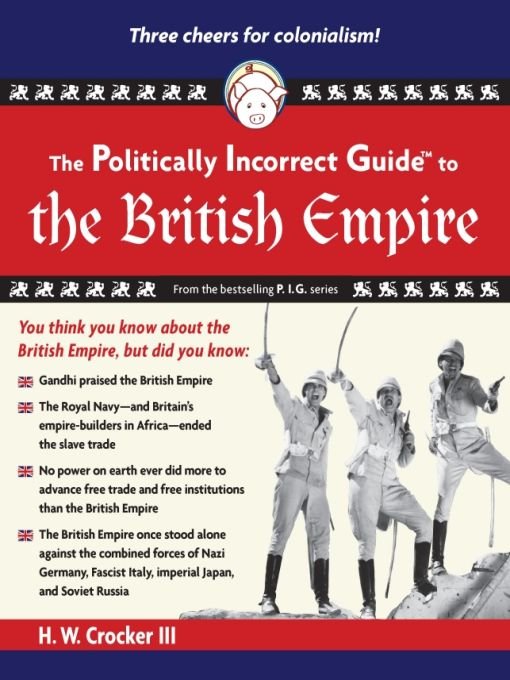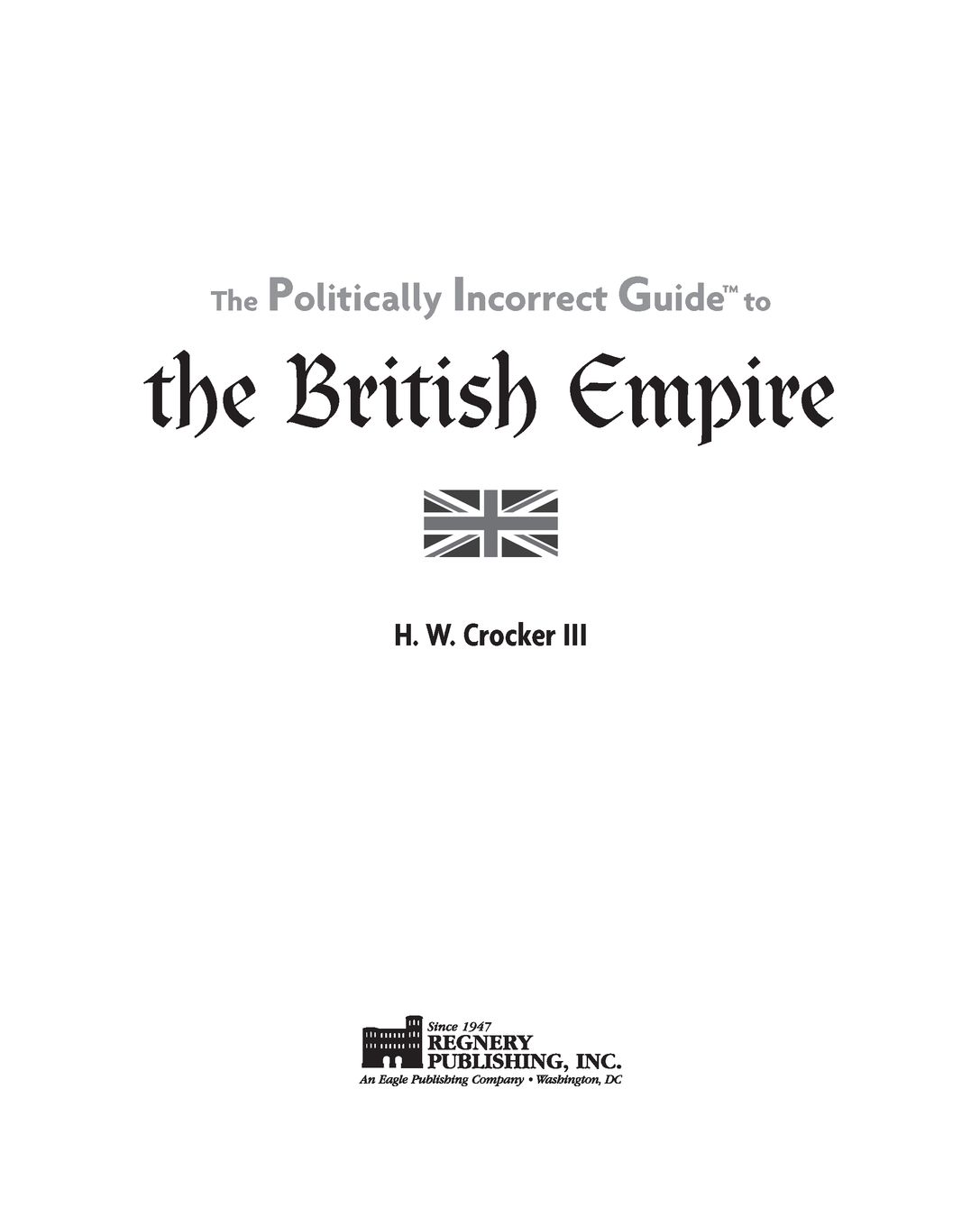The Politically Incorrect Guide to the British Empire
Read The Politically Incorrect Guide to the British Empire Online
Authors: III H. W. Crocker

BOOK: The Politically Incorrect Guide to the British Empire
9.08Mb size Format: txt, pdf, ePub


Table of Contents
Â
Â
Â
Â
Â
Â
Â
Â
Â
Â
Praise for
The Politically Incorrect Guide⢠to
the British Empire
the British Empire
“As someone who grew up in India, I often hear people ask, âWhat have the British done for us?' Until I read this book, I didn't have the full answer. And here is Crocker's answer: âApart from roads, railways, ports, schools, a parliamentary system of government, rights, separation of powers, checks and balances, the rule of law, and the English language . . . nothing!'”
âDinesh D'Souza
, President of the King's College and bestselling author of
The Roots of Obama's Rage
, President of the King's College and bestselling author of
The Roots of Obama's Rage
“
The Politically Incorrect Guide to the British Empire
⢠offers a cautionary tale for Americans who don't believe the sun could ever set on our great land. Even the nations collapse when a people no longer believes in itself or its mission. Harry Crocker's book is a jolly good read for Anglophiles and history buffs in general.”
The Politically Incorrect Guide to the British Empire
⢠offers a cautionary tale for Americans who don't believe the sun could ever set on our great land. Even the nations collapse when a people no longer believes in itself or its mission. Harry Crocker's book is a jolly good read for Anglophiles and history buffs in general.”
âBrett M. Decker
, Editorial Page Editor of
The Washington Times
and former Governor of the Hong Kong Foreign Correspondents' Club
, Editorial Page Editor of
The Washington Times
and former Governor of the Hong Kong Foreign Correspondents' Club
“H. W. Crocker's
Politically Incorrect Guide
â¢
to the British Empire
is a vivid, wide-ranging and persuasive defence of an empire that spread freedom, democracy and the rule of law to all the corners of the earth. As Crocker shows, the British people supported the Empire because they believed in the superiority of their civilisation. This belief was neither false nor hypocritical, and Crocker adroitly assembles the proof that the Empire was both a liberating force in a dangerous world, and a testimony to those old virtuesâgrit, leadership and the stiff upper lipâwhich were taught to British children of my generation, and which are being air-brushed from history by the cult of political correctness. This brave and persuasive book deserves to be read in all courses of school history: it tells an inspiring story in an inspiring way.”
Politically Incorrect Guide
â¢
to the British Empire
is a vivid, wide-ranging and persuasive defence of an empire that spread freedom, democracy and the rule of law to all the corners of the earth. As Crocker shows, the British people supported the Empire because they believed in the superiority of their civilisation. This belief was neither false nor hypocritical, and Crocker adroitly assembles the proof that the Empire was both a liberating force in a dangerous world, and a testimony to those old virtuesâgrit, leadership and the stiff upper lipâwhich were taught to British children of my generation, and which are being air-brushed from history by the cult of political correctness. This brave and persuasive book deserves to be read in all courses of school history: it tells an inspiring story in an inspiring way.”
âProfessor Roger Scruton
, philosopher, founding editor of
The Salisbury Review,
and author of more than two dozen books, including
Art and Imagination
and
A Political Philosophy: Arguments for Conservatism
, philosopher, founding editor of
The Salisbury Review,
and author of more than two dozen books, including
Art and Imagination
and
A Political Philosophy: Arguments for Conservatism
For Fiona, Regis, Rafferty, Garnet, Auberon, and Trajan
“The British Empire was a great and wonderful social, economic and even spiritual experiment, and all the parlour pinks and eager, ill-informed intellectuals cannot convince me to the contrary.”
âNoël Coward, diary entry, 3 February 1957
Part I

RULE BRITANNIA
Chapter 1

THE ENDURING EMPIRE
T
he British Empire still exists, thank goodness, with its outposts in the Falkland Islands, Bermuda, Gibraltar, the British Antarctic Territory, Pitcairn Island, and a peppering of other British Overseas Territories (including Anguilla, the British Virgin Islands, and St. Helena) and Crown Dependencies (closer to home, the Isle of Man and the Channel Islands). Together they ensure that the sun still does not set on the British Empire. At its height, though, Britain's empire was the largest ever, covering a quarter of the globeâor half of it, if you count Britain's control of the seasâand governing a quarter of the world's population.
he British Empire still exists, thank goodness, with its outposts in the Falkland Islands, Bermuda, Gibraltar, the British Antarctic Territory, Pitcairn Island, and a peppering of other British Overseas Territories (including Anguilla, the British Virgin Islands, and St. Helena) and Crown Dependencies (closer to home, the Isle of Man and the Channel Islands). Together they ensure that the sun still does not set on the British Empire. At its height, though, Britain's empire was the largest ever, covering a quarter of the globeâor half of it, if you count Britain's control of the seasâand governing a quarter of the world's population.
The empire was incontestably a good thing. The fact that it is controversial to say so is why this book had to be written. In the groves of academe, colonialism and imperialism are dirty words, the
fons et origo
of Western expansion with all its alleged sins of racism, capitalism, and ignorant, judgmental, hypocritical Christian moralism. But if the Left hates imperialism, so do many so-called paleoconservatives or paleolibertarians who blame the British Empire for dragging the United States into two unnecessaryâin their mindsâWorld Wars.
fons et origo
of Western expansion with all its alleged sins of racism, capitalism, and ignorant, judgmental, hypocritical Christian moralism. But if the Left hates imperialism, so do many so-called paleoconservatives or paleolibertarians who blame the British Empire for dragging the United States into two unnecessaryâin their mindsâWorld Wars.
Other books
Hellspark by Janet Kagan
Caleb by Alverson, Charles
While You're Awake by Stokes, Amber
Captive Bride by Bonnie Dee
Hidden Variables by Charles Sheffield
Rekindled (Titanium Security Series) by Cross, Kaylea
The Marquess by Patricia Rice
B00A3OGH1O EBOK by Wong, Allen
Truth or Dare by Jayne Ann Krentz
Collected Stories Of Arthur C. Clarke by C., Clarke, Arthur
